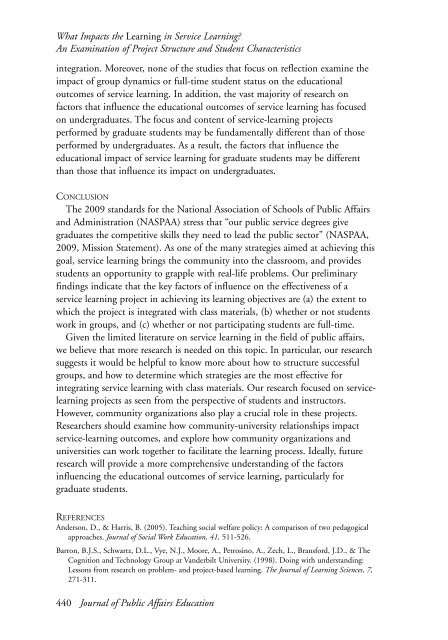JOURNAL OF PUBLIC AFFAIRS EDUCATION - National ...
JOURNAL OF PUBLIC AFFAIRS EDUCATION - National ...
JOURNAL OF PUBLIC AFFAIRS EDUCATION - National ...
Create successful ePaper yourself
Turn your PDF publications into a flip-book with our unique Google optimized e-Paper software.
What Impacts the Learning in Service Learning?<br />
An Examination of Project Structure and Student Characteristics<br />
integration. Moreover, none of the studies that focus on reflection examine the<br />
impact of group dynamics or full-time student status on the educational<br />
outcomes of service learning. In addition, the vast majority of research on<br />
factors that influence the educational outcomes of service learning has focused<br />
on undergraduates. The focus and content of service-learning projects<br />
performed by graduate students may be fundamentally different than of those<br />
performed by undergraduates. As a result, the factors that influence the<br />
educational impact of service learning for graduate students may be different<br />
than those that influence its impact on undergraduates.<br />
CONCLUSION<br />
The 2009 standards for the <strong>National</strong> Association of Schools of Public Affairs<br />
and Administration (NASPAA) stress that “our public service degrees give<br />
graduates the competitive skills they need to lead the public sector” (NASPAA,<br />
2009, Mission Statement). As one of the many strategies aimed at achieving this<br />
goal, service learning brings the community into the classroom, and provides<br />
students an opportunity to grapple with real-life problems. Our preliminary<br />
findings indicate that the key factors of influence on the effectiveness of a<br />
service learning project in achieving its learning objectives are (a) the extent to<br />
which the project is integrated with class materials, (b) whether or not students<br />
work in groups, and (c) whether or not participating students are full-time.<br />
Given the limited literature on service learning in the field of public affairs,<br />
we believe that more research is needed on this topic. In particular, our research<br />
suggests it would be helpful to know more about how to structure successful<br />
groups, and how to determine which strategies are the most effective for<br />
integrating service learning with class materials. Our research focused on servicelearning<br />
projects as seen from the perspective of students and instructors.<br />
However, community organizations also play a crucial role in these projects.<br />
Researchers should examine how community-university relationships impact<br />
service-learning outcomes, and explore how community organizations and<br />
universities can work together to facilitate the learning process. Ideally, future<br />
research will provide a more comprehensive understanding of the factors<br />
influencing the educational outcomes of service learning, particularly for<br />
graduate students.<br />
REFERENCES<br />
Anderson, D., & Harris, B. (2005). Teaching social welfare policy: A comparison of two pedagogical<br />
approaches. Journal of Social Work Education, 41, 511-526.<br />
Barron, B.J.S., Schwartz, D.L., Vye, N.J., Moore, A., Petrosino, A., Zech, L., Bransford, J.D., & The<br />
Cognition and Technology Group at Vanderbilt University. (1998). Doing with understanding:<br />
Lessons from research on problem- and project-based learning. The Journal of Learning Sciences, 7,<br />
271-311.<br />
440 Journal of Public Affairs Education

















